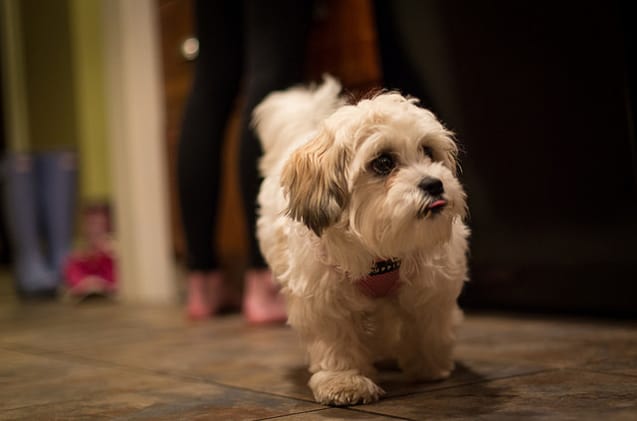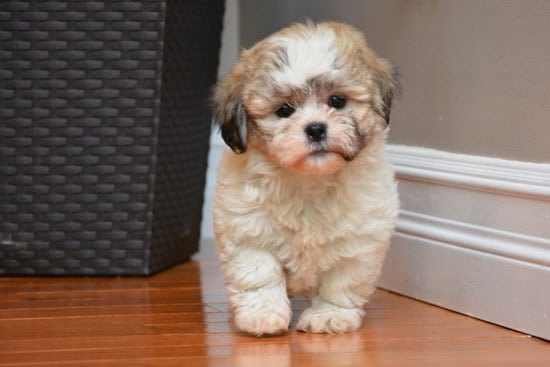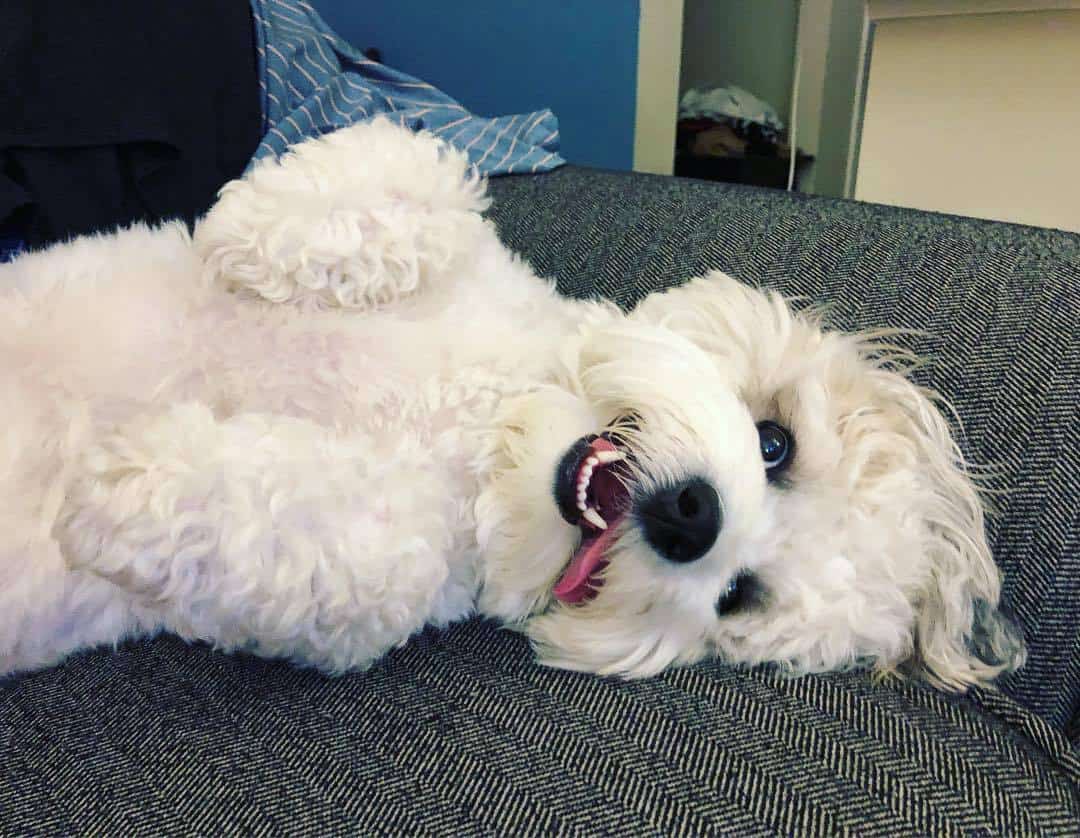In this post:
- What Do Shichons Look Like?
- Are Shichon Puppies Easy to Train?
- What Do They Eat?
- Do Shichons Suffer from Many Health Problems?
- How Often Do Shichons Need Exercising?
- Are Shichons Hypoallergenic?
- Any Other Grooming Advice?
- What’s Good About ‘Em?
- What’s Bad About ‘Em?
- What Should I Know About Buying Shichon Puppies?
- Final Thoughts

Shichon is a cross of purebred Shih Tzu and a purebred Bichon Frise, also known as Zuchon or Shih Tzu-Bichon Mix. It's relatively a small size dog at about 9 to 12 inches with a weight between 9 to 15 pounds. Shichons average lifespan is around 15 to 18 years.
Shichons are adorable; you’d be hard pushed to find someone who didn’t warm to this bundle of joy.
Shichons embody the small size of the Shih Tzu alongside the friendly disposition of the Bichon Frise. We love these dogs, so much so that we've dedicated an entire article to these beautiful creatures. Let’s dive in!
What Do Shichons Look Like?
They’re small in stature. Some would describe Shichons as ‘portable-size.’
As I pointed out in the first paragraph on average, they only weigh between 9 and 15 lbs (4 to 6.8 kilos) when fully-grown and are just 9 to 12 inches (22.8 to 30.5 cm) tall.
However, their fluffy coat often makes them look bigger than they actually are.
Their dense hair is mostly curly, long, and soft to the touch. You could easily pet these cute creatures for hours! Their silky coats usually boast one of the following colors:
- Apricot
- Black
- Cream
- Gray
- Red
- Silver
- White
- Tan
- Reddish Black
- Chocolate
Occasionally a pup might showcase a combination of these colors, although history suggests they commonly don the lighter shades from the above list.
Fun Fact: Oddly enough, the coloring of a Shichon puppy can change as they mature- how neat is that?
Typically, this dog has adorable hanging ears, a cute black nose, a medium length tail that curls over their back, and brown button-eyes.
On the subject of Shichon eyes, you should know they often grow excess hair in this area. This requires extra grooming to ensure it doesn’t get out of control. If left untamed it can affect their vision and increase the likelihood of eye infections. Therefore, we suggest tidying this up once every two to three weeks.

Are Shichon Puppies Easy to Train?
Shichons are intelligent, so despite their stubborn temperament, they're certainly trainable. However, like other small dog breeds, it can take a little extra time and perseverance to house train them.
Consistency is critical, so don't give up!
Socialization is also essential, regular interaction with other dogs and strangers helps them to maintain their naturally friendly disposition.
Check out this video and see for yourself all the cool tricks you could teach your Shichon:
What Do They Eat?
You’ll need to source dry kibble formulated for small breeds. It’s crucial to purchase specialist pet food because it’s designed to meet the high energy needs of smaller dogs.
You should give your Shichon anywhere between one and a half and two cups of food each day, divided into two meals.
Most importantly, you need to remember that Shichons can't eat wet foods. It's dangerous for these dogs, so don't be tempted to give it to them, always stick to the dry food.
Do Shichons Suffer from Many Health Problems?

The Shichon is a relatively healthy dog, and as mentioned above they have an average life expectancy between 15 and 18 years. However, they’re prone to suffering from ailments inherited by their parent breeds.
You should plan to meet with your vet annually; however, there isn't usually much to worry about. You should be aware that Shichons may develop the following issues:
Cataracts: this refers to the cloudiness of the lens of the eye (located behind the iris). This obstruction blocks the light passing through the retina. Sadly, this can cause a loss of vision if left untreated.
Hip Dysplasia: this is where the ball and socket joint inside the hip is damaged, so they don't align with one another correctly.
Hypothyroidism: this is a clinical condition that inhibits the production of hormones released from the thyroid gland. Here are a few warning signs to look out for:
- Excessive tiredness
- General weakness
- Unexplained weight gain
- Hair loss and excessive hair shedding
- Difficult regrowing hair
- Dry fur
- Excessive scaling
- Constant skin infections
Patellar Luxation: this ailment occurs when the kneecap dislodges from its normal position. It can only return to normal once the necessary muscles in the legs relax and lengthen. Therefore, you may see your dog holding their hind legs up for a few minutes; this is usually all that's necessary to realign the knee correctly.
Dry Eye Syndrome: This is where the cornea inside the eye severely drys and becomes inflamed. Here are a few things to watch out for:
- Blinking to excess
- Swollen blood vessels around the eyes
- Swollen eyes
- The development of a third eyelid.
- Mucus or pus discharging from the eye
- A loss of vision.
Portosystemic Shunt: This is where the major blood vessels are unable to supply the liver with the correct amount of oxygen and nutrients to function correctly.
If you think your pet's suffering from any of the above conditions, be sure to consult your vet as soon as possible, before the problems get any worse.
How Often Do Shichons Need Exercising?
The Shichon isn't an overly hyperactive breed; they only need walking around five miles a week, so they don't make the best work out buddies! In addition to their walks, they should also run around and play for at least 45 minutes a day.
It’s essential they reach their daily exercise quota. It's the only way they're able to work off all their energy. Rest assured, this shouldn’t be too difficult to achieve, these dogs naturally love to play.
Games like fetch are ideal for meeting their daily activity requirements! Not only is mental and physical stimulation great for your Shichon, but it’ll also help to prevent destructive behaviors like chewing furniture and shoes, etc.

Are Shichons Hypoallergenic?
Yes, they’re hypoallergenic, despite their great deal of hair.
Their coats are low maintenance and only require occasional grooming. However, we suggest brushing them at least once a week to prevent matting. This dog sheds a negligible amount, which is perfect for owners who don’t want or have the time to deal with a lot of mess.
Any Other Grooming Advice?
You should aim to clip their hair at least once every three months; this will help you maintain their gorgeous silky coats. In addition to this, they need their teeth brushing at least two to three times a week.
This will prevent the buildup of tartar and bad breath. You’ll also need to trim down their nails once every two weeks unless they've naturally managed to wear them down.
Don’t clip any further than the clear white area of the nail. If you snag the darker colored section, you may accidentally hurt your dog and cause them to bleed.
Our best advice is to bathe your Shichon only once a month. This is essential for helping them stay clean. However, don’t be tempted to bath this breed more than that, because you'll dry out their skin and cause irritation and discomfort.
Top Tip: if you’ve never bathed a dog before, you’ll need to buy pet-friendly shampoo. Then, gently massage it into your dog's coat, without tangling its fur, and rinse the coat clean (just like you would with your hair).
Then, apply conditioner as necessary and rinse clear again. Last but not least, comb through your Shichons fur while it’s still damp to avoid matting.
You’ll also need to clean your Shichons ears. Use a q-tip dipped in a pet-friendly alcohol solution (you can source this from a pet store or Amazon). NEVER put the q-tip inside the dog's ear only wipe clean the area you can visibly see, to help reduce wax buildup.
What’s Good About ‘Em?
This dog has a fabulous personality; they’re playful, lively and well-mannered. There are tons of things we love about these dogs, so we thought we’d list them:
#1 They Make Excellent Therapy Dogs
They’re affectionate, devoted and, love living with family members. They're great fun for kids because like we've already said, they love to play, yet Shichons are calm enough for indoor living. Overall, they enjoy doing whatever their owner does.
Their capacity to quickly adapt to their surroundings is one of the reasons why they make fabulous “therapy” dogs.
#2 They’re Innately Friendly
They're incredibly loving, which makes them fantastic with other pets and kids. However, you need to teach your children how to handle these dogs appropriately. Unfortunately, small dogs can get hurt while playing with young children, especially if the child isn't aware of your pet’s physical limitations.
Although your dog looks like a teddy bear, you can't allow your kids to treat it like one. Even a drop from a low height could accidentally cause painful fractures.
What’s Bad About ‘Em?

Really and truly, there aren’t many drawbacks to these fabulous bundles of fur.
#1 They Bark Occasionally
Like other breeds Shichons have an occasional tendency to bark; although this might be annoying, it can also be a good thing.
Shichons are perfect if you're on the hunt for a friendly watchdog. They frequently alert their owner’s to strangers or intruders.
#2 They Need a Lot of Attention
This breed needs a lot of attention, which is fabulous if you’re an owner that has a lot of time to dedicate to your dog.
However, if you have a busy work schedule and a crazy social life, then the Shichon probably isn’t the best pet for you. These dogs don’t do very well when they’re left alone and can suffer from separation anxiety as a result.
What Should I Know About Buying Shichon Puppies?
If you’re thinking about buying a Shichon puppy, then you should expect to part with anywhere between $800 and $1200.
A potential Shichon owner would ideally have a medium to a large-sized yard for them to play in. However, this breed can be equally happy living inside an apartment as long as you commit to giving them enough exercise.
When you’re purchasing a pup, you need to understand the concept of ‘generation.’ A first generation crossbreed is one whose parents are both purebreds.
Although you can’t predict which of the parent’s genes will be dominant, a first generation litter is usually a safer bet. They’re traditionally healthier and way more likely to inherit all the positive attributes of both parents.
On a similar note, you should always meet with the parents before deciding on your pup. This usually gives you a good indicator of what your puppy will be like when it fully matures.

Final Thoughts
All in all, Shichons make ideal family pets. They’re incredibly sweet-natured, and they look adorable (just like their nickname the teddy bear suggests!)
Plus they’re great for owners who can't take their dogs on long walks because they don’t need a massive amount of exercise. On the whole, there’s nothing to dislike about these gorgeous creatures!






